Beans, per se, won’t make you fat. However, eating high portion sizes with other high-calorie additions, such as bread, rice, oil, cheese, or fatty meats with beans can make you gain weight. Even drinking alcohol or sugar-rich beverages with beans may have detrimental effects on weight loss.
The cooking method also plays a key role in the calorie content of beans. Many traditional bean recipes use way too much oil, while canned baked beans and other processed beans may have added sugar.
Beans are good for weight loss
We can’t consume too many calories
Above all, beans support weight loss, due to their low calorie content. Most common bean varieties contain no more than 150 calories per 100g. A typical serving contains no more than 200-250 calories!
Lentils and fava beans have the lowest calorie content with less than 120 calories per 100g!
| calories (per 100g, cooked) | calories (per serving) | carbs (g) | protein (g) | fiber (g) | |
| soybeans | 172 | 296 | 10 | 10 | 9.2 |
| fava beans | 109 | 187 | 19.5 | 7.5 | 5.4 |
| lentils | 115 | 216 | 20 | 9 | 7.9 |
| black beans | 132 | 230 | 23.7 | 8.9 | 8.7 |
| white beans | 138 | 240 | 25 | 9.7 | 6.3 |
| pinto beans | 143 | 245 | 26.2 | 9 | 9 |
| chickpeas | 163 | 270 | 27.2 | 8.8 | 7.6 |
Of course, it is possible to gain weight if you eat too many calories, regardless of what food you are eating. However, most people would be full before overconsuming beans.
Can Carbs in beans make you fat?
Beans are good sources of quality carbs. A serving provides between 40 and 50 grams of carbs.
Pink beans have the highest, while soybeans have the lowest carbohydrate content. If you’re cautious about the consumed amount of carbs in a day, you should eat beans relatively low in carbs.
| carbs (g) per 100g | carbs (g) per serving | |
| pink beans | 28 | 47 |
| navy beans | 26 | 47 |
| chickpeas | 27.4 | 45 |
| pinto beans | 26.2 | 45 |
| white beans | 25 | 45 |
| green/French beans | 24 | 42 |
| lentils | 20 | 40 |
| kidney beans | 23 | 40 |
| red beans | 23 | 40 |
| lima beans | 21 | 39 |
| fava beans | 20 | 33 |
| soybeans | 8.4 | 14.4 |
| tofu | 9 | 7.5 |
Carbs in beans are mainly starch and fiber. Most beans are low in sugar.
Carbs of beans won’t make you fat, though. We need carbs. Carbs are the main source of energy for the human body.
However, beans aren’t suitable for low-carb diets, like keto. People on keto should consume less than 50 grams of carbs a day.[2]
Only soybeans are keto-friendly, as they’re low in net carbs. Soybeans have the lowest carbohydrate content, containing fewer than 15 grams of carbs per serving. Most of them are fiber, though. Soybeans have only 4 grams of net carbs per serving!
Beans are naturally low in Sugar
Most beans are pretty low in sugar. For instance, common beans, such as navy, kidney and pinto beans contain less than 1 grams of sugar per serving! Lima beans, soybeans, lentils, and fava beans contain low amounts of sugar as well.
Chickpeas are the richest common beans in sugar, containing almost 8 grams per serving.
| sugar (g) per 100 g | sugar (g) per serving | |
| chickpeas | 4.8 | 7.9 |
| lima beans | 2.9 | 5.5 |
| soybeans | 2.4 | 4.1 |
| lentils | 1.8 | 3.5 |
| fava beans | 1.8 | 3.5 |
| tofu | 2.7 | 2.4 |
| navy beans | 0.4 | 0.7 |
| pink beans | 0.4 | 0.7 |
| kidney beans | 0.3 | 0.6 |
| pinto beans | 0.3 | 0.6 |
Protein in beans supports Weight Loss
Furthermore, beans are pretty high in protein. Actually, beans are among the best plant-based sources of protein. They contain more than 10 grams of protein per serving.
The richest beans in protein are soybeans. They contain 10 grams of protein per 100g. Also, white beans, pinto beans, lentils, black beans, chickpeas, and fava beans are great sources of plant-based protein.
Protein:
- keeps us full for a long time.
- has the highest thermic effect. Up to 30% of protein is burned during digestion!
- preserves the muscle mass while dieting.
Best plant-based sources of Protein
Soybeans are among the best foods you can eat for weight loss because they’re only beans with complete protein. Soybean protein contains all 9 essential amino acids.
Actually, only a few plant-based foods are complete protein. Besides soybeans, only chia seeds, hemp seeds, pumpkin seeds, quinoa, buckwheat, spirulina, and amaranth are plant-based foods with complete protein.
People who follow a plant-based diet should combine a wide variety of foods in order to get all essential amino acids. Moreover, you could boost your daily protein intake by consuming a scoop of a high-quality plant-based protein powder.
On the other hand, all animal-derived foods are complete protein.
Can Fat in Soybeans make you Gain Weight?
On the contrary, most beans are low in fats. Consuming less fat could help you lose weight. 1 gram of fat has 9 calories, while 1 gram of protein or carbohydrate has only 4 calories!
We need some fat to function properly and to lose weight, though. Fat is important for energy metabolism.
Soybeans are good sources of fat. Actually, they’re the only beans high in fat. A serving of cooked soybeans provides about 15 grams of fat.
| fat (g) per 100g | fat (g) per serving | |
| tofu | 20.3 | 17.1 |
| soybeans | 9 | 15.4 |
| chickpeas | 2.6 | 4.2 |
| navy beans | 0.6 | 1.1 |
| pinto beans | 0.65 | 1.1 |
| kidney beans | 0.5 | 0.9 |
| pink beans | 0.5 | 0.83 |
| lentils | 0.4 | 0.7 |
| lima beans | 0.4 | 0.7 |
| fava beans | 0.4 | 0.7 |
Due to their high-fat content, soybeans have the most calories as compared to other beans. They have almost 300 calories per serving. So, you shouldn’t overconsume them if you’re on a diet. A serving a day is beneficial, though.
Fiber in beans is key for weight loss
Above all, beans support weight loss, due to their high fiber content. The 25-40% of carbs in beans are fiber.
Foods high in protein and fiber promote satiety. Beans are super filling, as they’re both high in protein and fiber.
Soybeans are the richest beans in fiber. Pinto beans, black beans, lentils, chickpeas, and white beans are pretty high in fiber as well.
Beans are the richest foods in fiber! Just a serving of beans can provide more than 50% of the Daily Value of fiber!
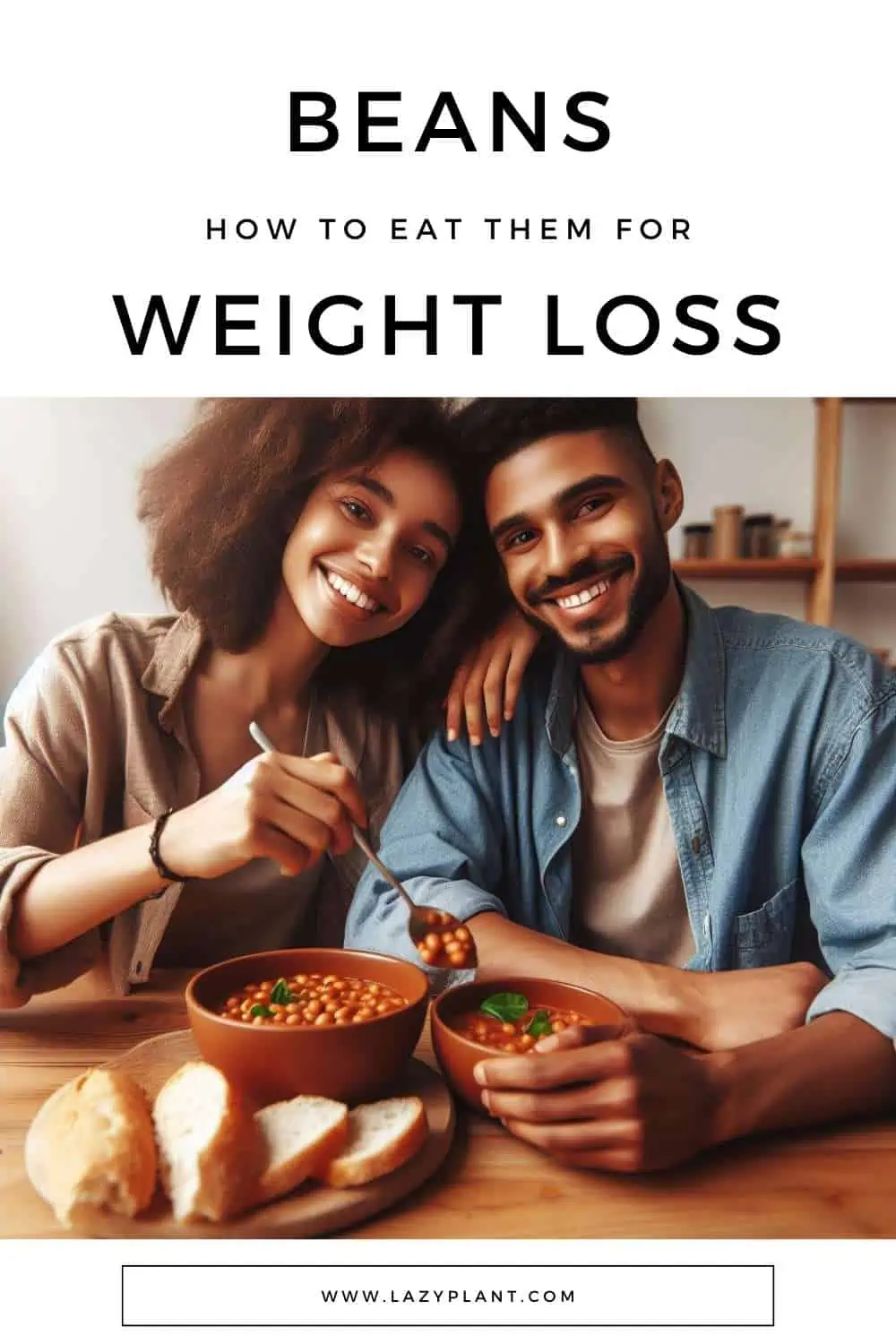
Benefits of Fiber for Weight Loss & Health
Fiber keeps us full for a long time. It takes a lot of time to digest. Also, fiber expands in the stomach, sending satiety signals to the brain. Fiber regulates hunger!
Also, adequate intake of dietary fiber has been linked to many health benefits, such as reduced cholesterol and blood pressure. In addition, fiber may reduce the risk of insulin resistance, cardiovascular disease and overall mortality!
The American Heart Association recommends consuming at least 28 grams of fiber per day on a 2,000-calorie diet. Beans consumption boosts the daily fiber intake.[3]
According to many studies, the regular consumption of beans drops total caloric intake, as they significantly decrease hunger. Fiber in beans increases satiation.[4]
Beans could be your friend against obesity. Diets high in beans have been linked to decreased body fat levels and improved body composition.[5,6]
However, consuming large portions of beans, like any other food, can contribute to an excess of calories. But, as beans are pretty rich in fiber, most people will feel full way before overeating them.
Nutritional Value
| Bean Name | Iron (mg) | Zinc (mg) | Magnesium (mg) | Manganese (mg) | Phosphorus (mg) | Potassium (mg) | Copper (mg) | Folate (mcg) |
|---|---|---|---|---|---|---|---|---|
| Chickpea | 2.9 | 1.53 | 48 | 1 | 168 | 291 | 0.35 | 172 |
| Fava | 1.5 | 1 | 43 | 0.42 | 125 | 268 | 0.26 | 104 |
| Kidney | 2.94 | 1.1 | 45 | 0.48 | 142 | 403 | 0.24 | 130 |
| Lentil | 3.3 | 1.3 | 36 | 0.5 | 180 | 369 | 0.25 | 181 |
| Lima | 2.45 | 0.8 | 74 | 1.25 | 130 | 570 | 0.3 | 26 |
| Navy | 2.4 | 1 | 53 | 0.53 | 144 | 389 | 0.21 | 140 |
| Pinto | 2.1 | 1 | 50 | 0.45 | 147 | 436 | 0.22 | 172 |
As you can see, most common beans are rich in iron, magnesium, manganese, phosphorus, potassium, copper, folate, as well as many other B vitamins. All these compounds play a role in burning fat and increased energy metabolism:
- Iron helps transport oxygen to cells, which can boost metabolism and help you burn more calories.
- Magnesium helps regulate blood sugar levels, which can help prevent overeating and cravings.
- Manganese plays a role in fat metabolism.
- Phosphorus helps build and maintain muscle mass, which can help you burn more calories at rest.
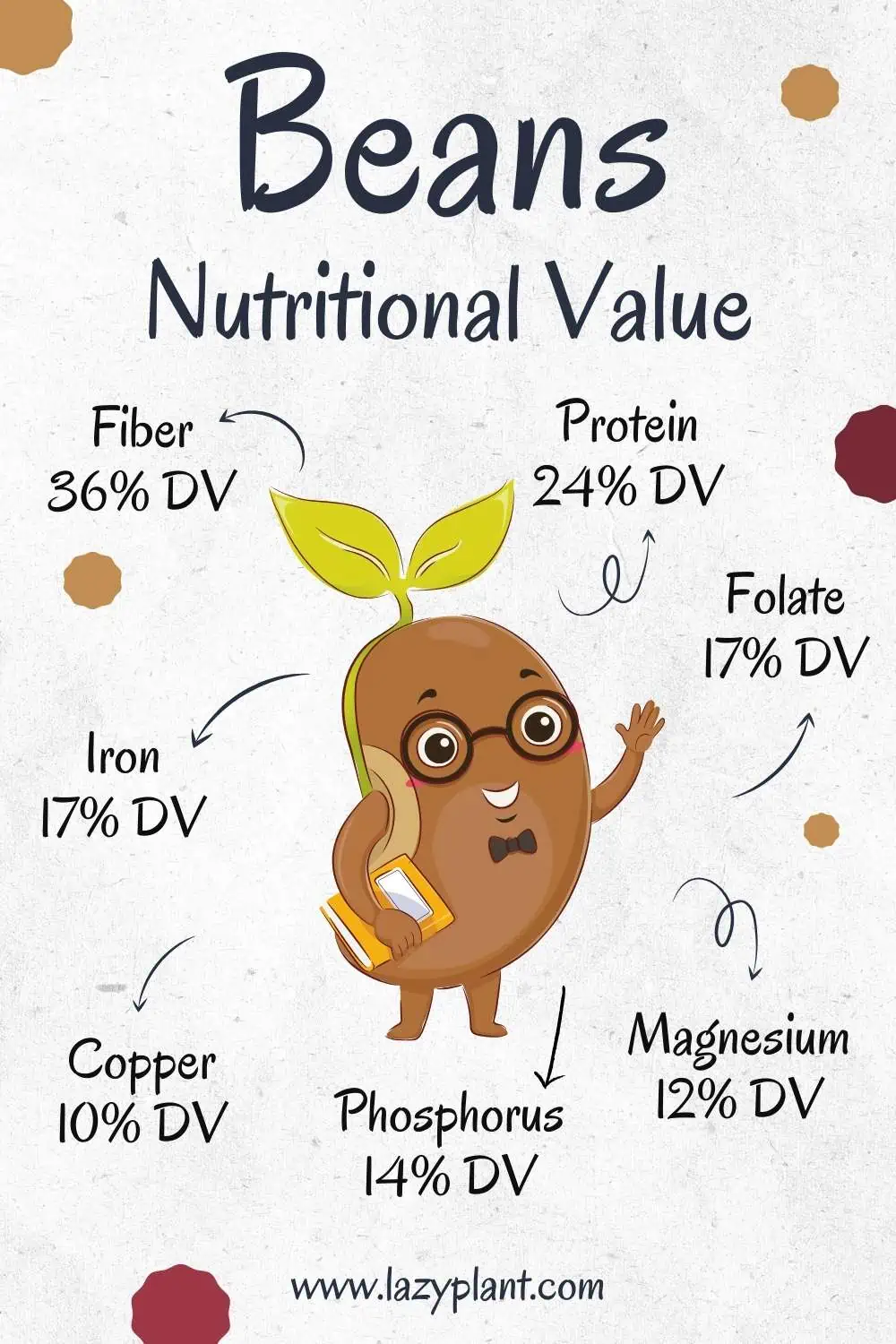
- Potassium helps regulate fluid balance in the body, which can help reduce bloating and make you feel fuller.
- Folate helps support healthy cell growth, which may help protect against obesity-related diseases.
- Niacin helps convert food into energy, which can help you burn more calories.
- Riboflavin helps convert food into energy and may help reduce appetite.
- Thiamin helps convert food into energy and may help improve mood, which can help you make healthier food choices.
Copper helps produce energy, which can help you maintain a healthy weight. Also, it’s necessary for the formation of collagen, which is important for skin health. When you lose a significant amount of weight, your skin may not be able to retract back to its original shape, leading to saggy skin. Boosting the natural synthesis of collagen could protect your skin’s elasticity.
| Nutrient | Range | % DV Range |
|---|---|---|
| Calories | 200-300 | 10-15% |
| Protein | 7-18 | 18-36% |
| Carbs | 38-48 | 14-16% |
| Fiber | 5-20 | 18-80% |
| Potassium | 488-1,000 | 10-21% |
| Calcium | 56-256 | 6-26% |
| Iron | 3-6.6 | 17-37% |
| Magnesium | 48-96 | 12-24% |
| Phosphorus | 98-560 | 14-80% |
| Copper | 0.2-0.8 | 10-40% |
| Folate | 66-640 | 17-160% |
| Vitamin B6 | 0.2-0.8 | 10-40% |
| Niacin | 0.8-2.4 | 4-12% |
| Riboflavin | 0.2-0.4 | 10-20% |
| Thiamin | 0.2-0.4 | 10-20% |
The key role of Beans in Gut Health
The gut microbiome, the community of bacteria that reside in your intestines, plays a crucial role in various aspects of your health, including weight management and obesity. A healthy gut microbiome can promote weight loss and prevent obesity, while an unhealthy gut microbiome can contribute to weight gain.
The gut microbiome helps break down food, absorb nutrients, and regulate the release of hormones that control appetite and metabolism. An imbalance in the gut microbiome can impair these processes, leading to weight gain.
Regular consumption of beans can alter the gut microbiome composition towards a more diverse and potentially beneficial profile.
Fiber and protein in beans can help promote the growth of beneficial bacteria in the gut. They can increase the abundance of Bifidobacterium and Lactobacillus in the gut, which are beneficial bacteria that can help improve gut health.
Can beans make you fat?
Beans, per se, won’t make you fat. However, eating high amounts of bread, or other high-calorie additions, such as oil, cheese, or fatty meats with beans, may make you gain weight!
Beans with rice or bread can make you gain weight
Pairing beans with high-calorie accompaniments, such as rice or bread, can contribute to a caloric surplus. Especially, if eating them without considering portion sizes and overall calorie intake.
Consume up to two slices of bread a day if you’re on a diet.
Certainly, you should avoid drinking high-calorie beverages alongside bean dishes. Too much alcohol and added sugar make us fat. They can contribute to an excess of calories and even decrease the effectiveness of certain functions of body metabolism.
Certain recipes are fattening
Traditional refried beans often contain added fats and calories, contributing to weight gain if consumed in excess.
Also, adding high amounts of vegetable oils in bean recipes can make you fat. Vegetable oils are calorie-dense foods. Just a tablespoon of any vegetable oil has about 125 calories!
Moreover, some baked bean recipes include added sugars, leading to a significantly higher calorie content.
Most noteworthy, the combination of added sugar, with carbs of beans and bread could lead to sudden spikes and drops of insulin. This can have detrimental effects on body weight as well as health if it happens on a regular basis.
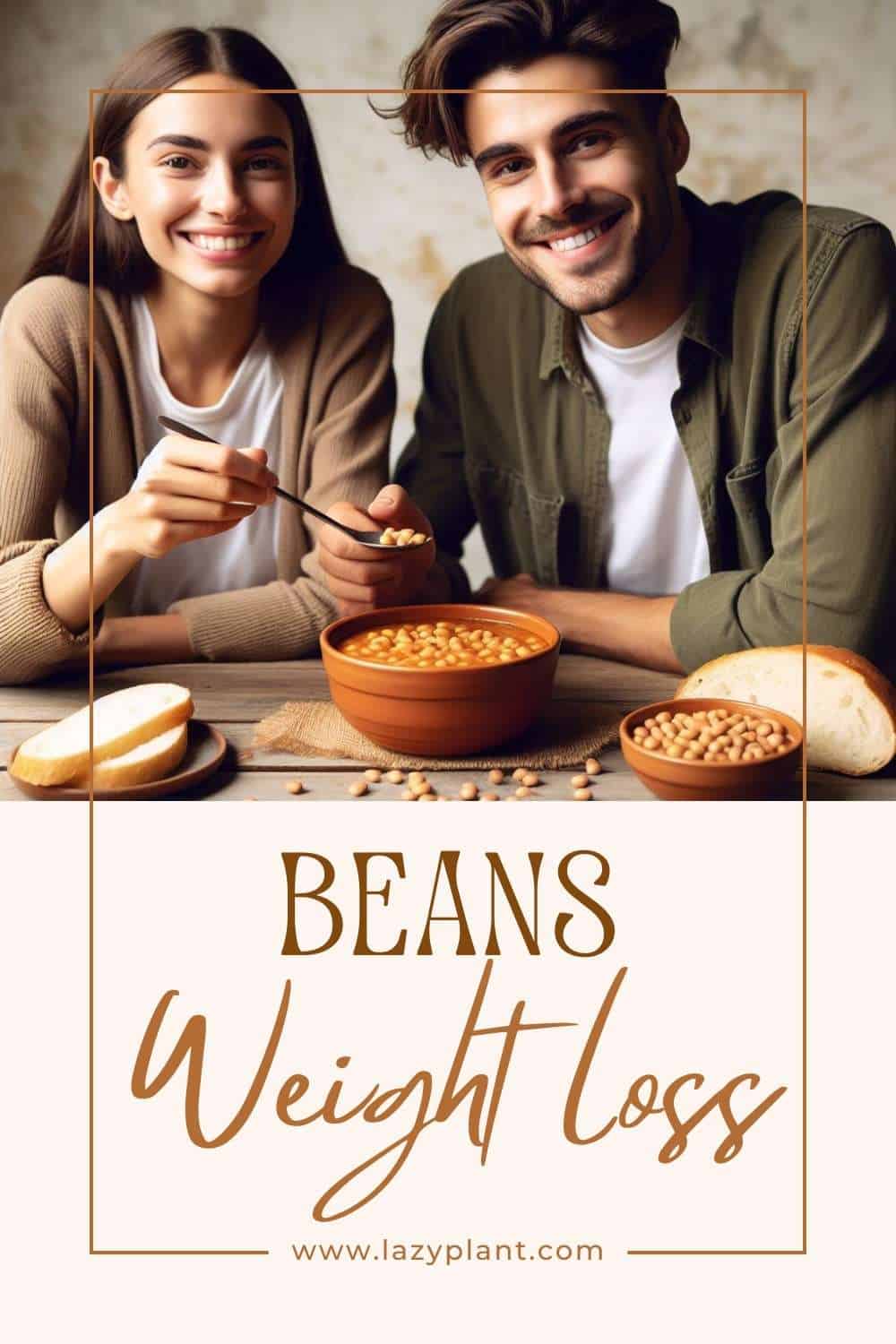
Keep in mind that some processed bean products, like certain veggie burgers or canned baked beans, may contain both added fats and sugars. This combination of macronutrients is pretty bad for weight loss.
Above all, bean recipes that involve frying or deep-frying can make you fat. They add way too many extra calories from oil.
Adding excessive amounts of high-calorie condiments, sauces, or dressings to bean dishes can contribute to weight gain as well.
Glycemic Index
As a rule of thumb, we should avoid consuming foods high in carbs and sugars. They tend to spike blood sugar levels. These foods make us gain weight.
However, as beans are high in protein and dietary fiber, they have a low to medium Glycemic Load. This means that moderate amounts of beans won’t make us fat, as they don’t spike blood sugar levels.
For instance, chickpeas have a Glycemic Load of 11, while lentils have a Glycemic Load of 5.[7]
Lentils, in particular, are great for weight loss, as they have a low glycemic index and they have a few calories.
Following a balanced diet containing a wide variety of foods with a low Glycemic Load has been linked to a decreased risk of obesity!
Bean Flours can make you gain weight
Legume-based flours, such as chickpea flour or lentil flour, can be beneficial for weight loss in several ways. They’re packed with high-quality protein, fiber, vitamins, and minerals.
Also, they provide a gluten-free alternative for baking and cooking.
But, using large amounts of legume-based flour may add too many extra calories. Most legume-based flours have between 340 and 400 calories per 100g.
As they’re healthy. people overconsume them, not realizing that they still get a high amount of calories!
Does Bloating affect body weight?
Bloating itself does not contribute to weight gain. Bloating is often a result of gas production in the digestive system, and it can make the abdomen feel swollen or distended.
This sensation is usually temporary and not related to an increase in body fat.
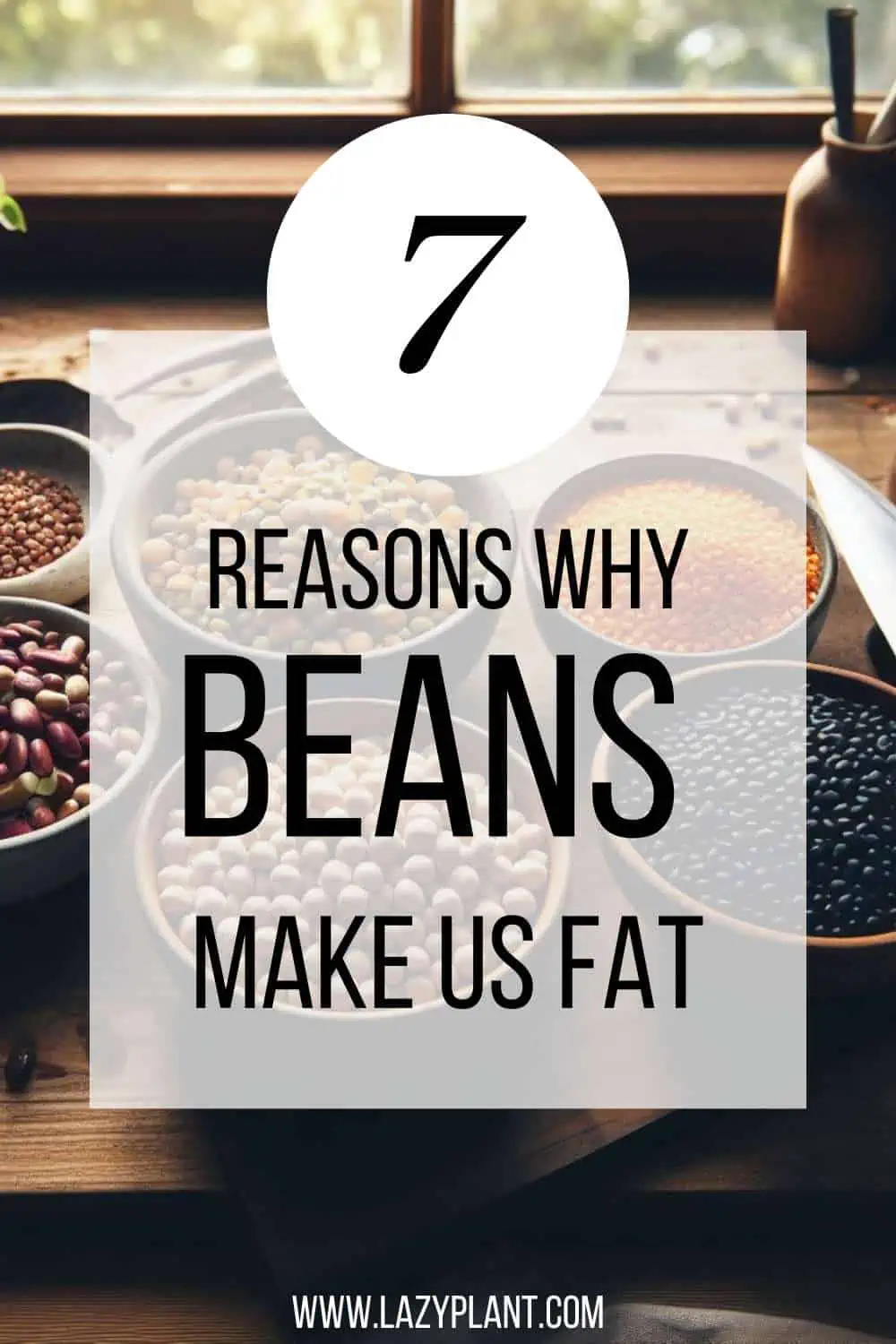
Beans contain oligosaccharides, a type of carbohydrate that some people find challenging to digest. Bacteria in the colon break down these compounds, producing gas as a byproduct, which can lead to bloating.
Moreover, some people lack certain enzymes necessary to break down specific components in beans, which can result in increased gas production and bloating.
Also, bloating is caused by a sudden increase in fiber intake. Beans are among the richest foods in fiber. Fiber is generally beneficial for digestive health. However, an abrupt increase in fiber intake, especially if you’re not used to it, can lead to temporary bloating as your digestive system adjusts.
How to stop bloating after eating beans?
Inadequately cooked beans may contain substances that are harder to digest, leading to bloating.
Before cooking, soak and rinse beans a couple of times to prevent bloating. Rinsing reduces the concentration of the compounds that make you feel bloated.
You could add some baking soda to the beans as well. Baking soda is alkaline and can help soften the texture of beans by breaking down their cell walls. This can be particularly useful for older or tougher beans that may take longer to cook.
By softening the beans, baking soda may reduce the overall cooking time.
Moreover, baking soda may help reduce the compounds in beans that cause gas and indigestion. It does this by making the beans more alkaline, which can help break down oligosaccharides, which are responsible for gas production.
You can add a small amount of baking soda to the soaking water or directly to the cooking water. In fact, small doses of baking soda may be good for you.
Also, soaking makes beans more bioavailable. We absorb more calcium and iron from soaked beans.
How to eat Beans for a leaner body?
There are countless ways to incorporate beans into your daily eating habits. Try to add nutrient-dense foods for optimum health and weight-loss benefits. Here are some recipe ideas:
- Black beans and quinoa: This combination is a great source of complete vegan protein, fiber, iron, magnesium, and manganese. Also, quinoa is a superfood for weight loss, as it’s packed with unique antioxidant compounds.
- Chickpeas and spinach: This combination is rich in iron, protein, vitamin C, and fiber.
- Kidney beans and brown rice: This combination is a great source of protein, fiber, and complex carbohydrates.
- Lentils and sweet potatoes: This combination is rich in fiber, protein, and carotenoids. Air-fried and baked sweet potatoes can be a great addition to any low-calorie diet.
- Navy beans and kale: This combination is rich in fiber, protein, and vitamins A, C, and K.
- Pinto beans and avocado: This combination is rich in fiber, protein, and healthy fats.
- Soybeans and broccoli: This combination is rich in protein, fiber, and vitamins C and K.
- White beans and chia seeds: This combination is rich in fiber, protein, and omega-3 fatty acids.
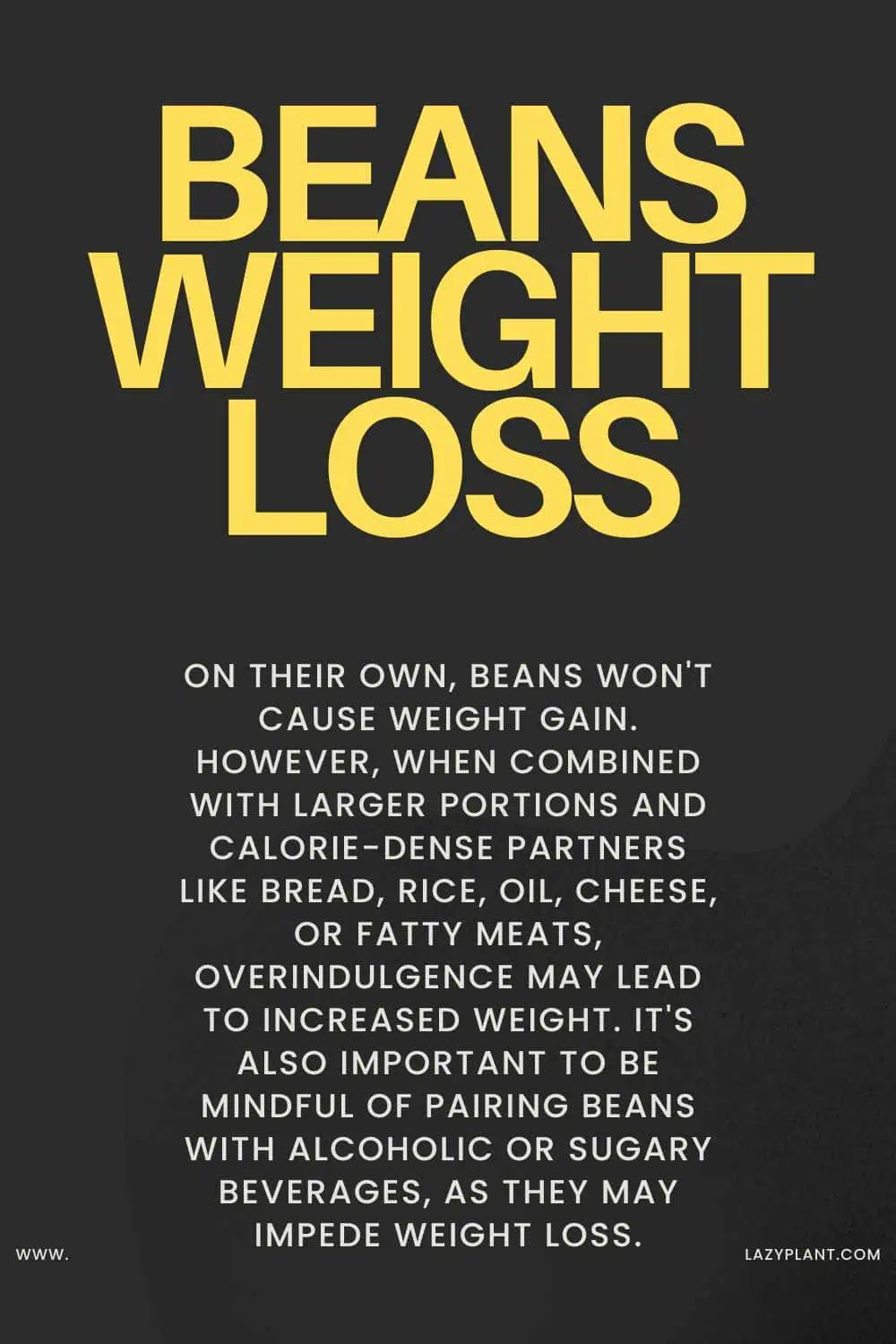
Here are some specific suggestions for incorporating beans into your weight loss diet:
- Eat beans for breakfast. This is a great way to start your day off with a protein- and fiber-rich meal that will help you feel full until lunchtime.
- Add beans to your lunch. Beans can be added to soups, salads, stews, and other dishes.
- Make bean-based snacks. Hummus, bean dips, and bean salads are all healthy and satisfying snacks that can help you curb cravings.
Here are some additional tips for eating beans for weight loss:
- Cook beans from scratch. This will help you control the sodium content of your beans. Excess salt intake may put you at risk for high blood pressure, heart disease, and headaches.[8]
- Don’t add too much fat to your beans. Fat can add calories to your dish, so it is best to season them with herbs and spices instead. After all, these are the richest foods in antioxidant compounds!
- Eat beans with other protein sources, such as lean meats, fish, or poultry. This will help you get all of the essential amino acids that your body needs.
How long after eating Beans does your Weight change?
The time it takes to see changes in body weight, waist circumference, and belly fat burning after starting to eat beans can vary depending on several factors such as the amount of beans consumed, and the individual’s overall diet and lifestyle.
The effects of consuming beans may not be immediate on your body. It may take several weeks or months to see significant changes in body weight, waist circumference, and belly fat burning.
Avoid consuming beans with bread, rice, oil, cheese, fatty meats, or any other calorie-dense food for faster results.
Don’t forget that it’s far more important to follow a healthy, hypocaloric, balanced diet for achieving your dream body than any specific food. Moderate exercise, good mood, and a good night’s sleep are also crucial factors.
What’s the best time of the day to eat Beans?
The best time of the day to eat beans for weight loss is generally any time that fits into your overall eating plan and helps you feel full and satisfied. Lunch is probably the best time of the day to eat beans for most people.
Does eating beans before bed make me fat?
If you are looking to lose weight, it is generally a good idea to avoid eating beans late at night. This is because beans can be difficult to digest, and eating them late at night can lead to digestive issues, such as bloating and gas.
These adverse effects could negatively affect sleep quality, which plays a tremendous role in burning belly fat and metabolism.
If you don’t experience any adverse effects, you could consume beans at dinner. But, it’s highly recommended to be at least a couple of hours before bedtime.
What’s my personal experience?
I started consuming beans for their health benefits, not for losing weight. For instance, their consumption has been associated with a decrease in cardiovascular risk factors.[9]
Moreover, according to a recent meta-analysis study, a higher legume intake was associated with lower mortality from all causes and stroke. A daily consumption of 1/4 cup may be enough.[10]
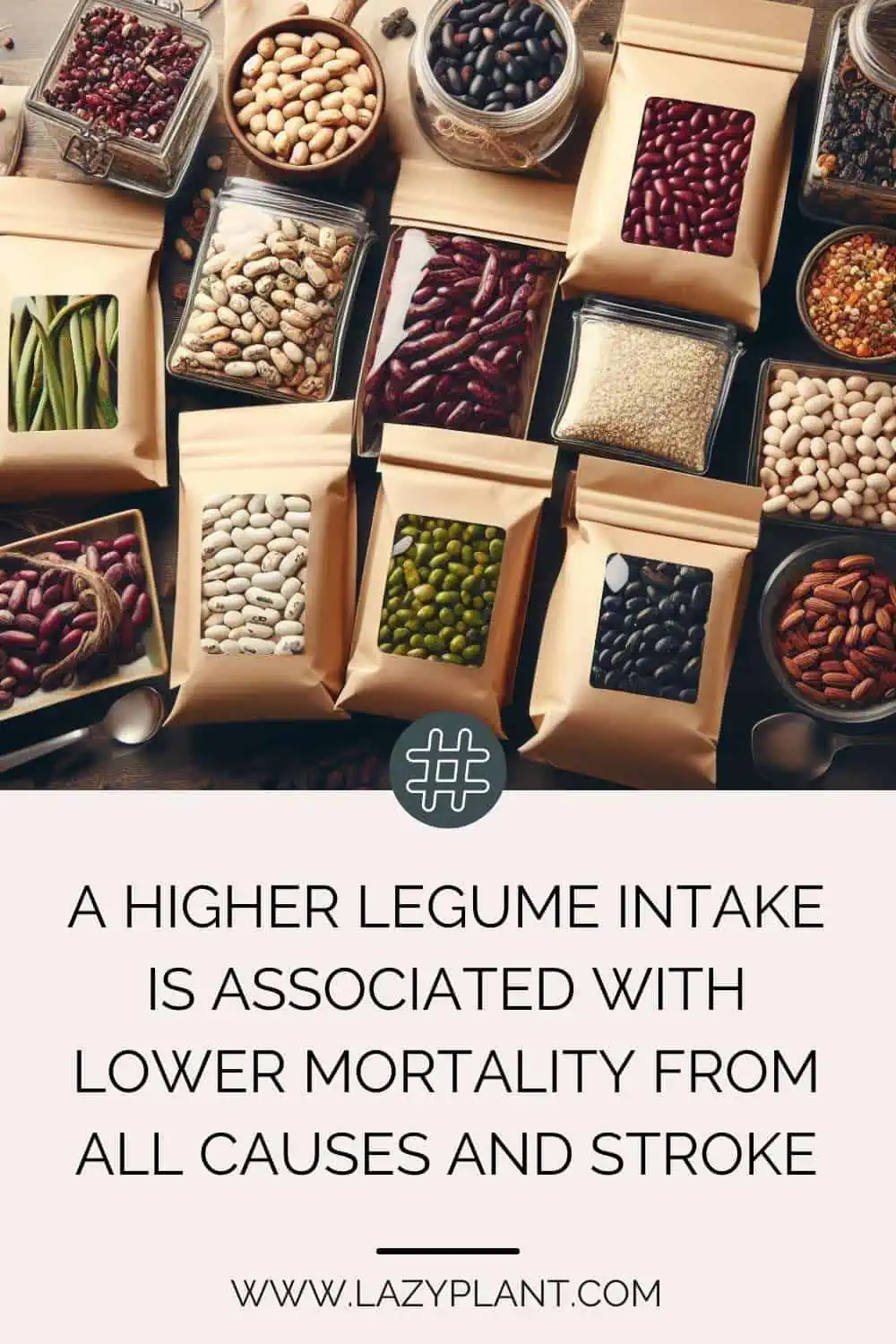
But, after started consuming beans I realized that I was really full for many hours and my cravings significantly reduced.
I add them as a side dish at lunch. My favorite is hummus. When feeling hungry, I dip 3-4 whole-grain breadsticks in hummus. The effect of this healthy snack on cravings still amazes me.
I managed to lose almost two pounds in a month, as I consumed fewer calories. Controlling cravings was a huge obstacle for me to stick to a weight-loss plan. Total sugar reduction was also a crucial factor.